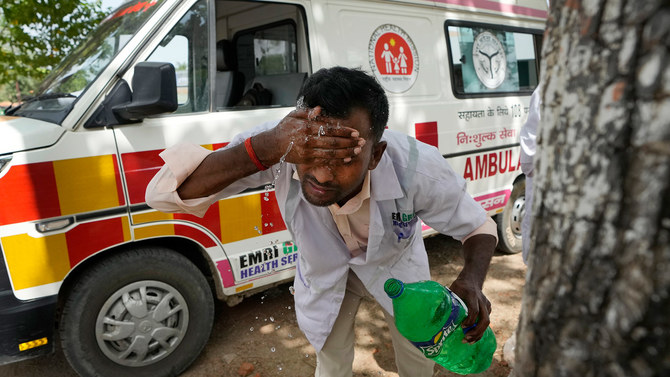BANPUR: Siren blaring, Sunil Kumar Naik's ambulance tore across a dry and rocky countryside blasted by dangerous midday heat, rushing to check on a vomiting and dizzy 30-year-old man with possible heat stroke. As soon as they reached the man's village, Naik's paramedic partner guided the stricken man into the ambulance, then checked his pulse and oxygen levels as Naik sped back to the public hospital.
With barely a moment to drink some water and splash their faces, the men were dispatched again, this time to pick up a pregnant woman who had gone into labor as the temperature soared to 43 degrees Celsius (109.4 Fahrenheit). And so went another furious 12-hour shift in India's increasingly deadly summer, when Naik and paramedic Jitendra Kumar sometimes find themselves hurrying to as many as twice the usual number of calls.
Extreme heat is fast becoming a public health crisis in India, with more than 150 people dying during the latest brutal heat wave in June. Prolonged heat waves, sometimes classified as a slow-onset disaster, are one of the deadliest consequences of global warming that India faces. The government estimates nearly 11,000 people have died during heat waves this century, yet experts say such figures are likely a vast undercount.
Banpur, a village of about 13,000, lies in the mostly poor Bundelkhand region deep in India's interior. It's arid and stony, with little tree cover to protect people in one of the nation's hottest regions. Naik and Kumar make up one of two ambulance crews that cover the village and surrounding area, carrying patients to the government-run public health center. The state and federal governments help fund the not-for-profit ambulance service, making it a free lifeline for patients.
“I consider every patient my family member. I don’t care if it is hot or if I am hungry, I go on a mission to get the patient out and transport them to the hospital,” said Naik, whose only protection from the heat and dry, hot winds is a white cotton towel wrapped around his head. “It is difficult for me driving the vehicle in extreme heat, but it is nothing compared to the hardships of a patient in a medical emergency."
Health experts say the heat can kill slowly — and quickly. The quick way could be through simple heat stroke, while a slower death may result when people who already have serious health conditions suffer through extended heat, said Dileep Mavalankar, former head of the Indian Institute of Public Health, Gandhinagar.
Mavalankar was instrumental in developing India's first heat action plan, for the city of Ahmedabad in 2013, three years after more than 1,300 people died during a heat wave there. The plan set out guidelines that included issuing a heat alert when temperatures rose past 41 degrees Celsius (105.8 Fahrenheit), educating people such as outdoor laborers, farmers and others exposed to heat about the risks they face, and providing resources to local health centers and hospitals to deal with heat-related illnesses.
“When a cyclone happens, everyone is on alert, and they act immediately but there is little awareness or action to deal with extreme heat," Mavalankar said. "There needs to be a media blitzkrieg, local governments should warn people to stay indoors and make their hospitals ready to deal with heat-related cases,” he said.
Aditya Valiathan Pillai of the Centre for Policy Research, a New Delhi think tank, recently studied India’s readiness to respond to extremely hot weather. He said such plans — which include cooling centers and health care assistance —- are essential to saving lives.
Climate experts say that heat waves are here to stay, and India needs to prepare better to deal with their consequences. A study by World Weather Attribution, an academic group that examines the source of extreme heat, found that a searing heat wave in April that struck parts of South Asia was made at least 30 times more likely by climate change.
Yet poorer regions like Uttar Pradesh, where Banpur lies, may have a plan on paper but not the ability to carry it out.
“The afflicted population is vulnerable because it lacks resources and has insufficient infrastructure to handle severe temperatures,” said Anjal Prakash, a research director at the Indian School of Business, Hyderabad and author of several U.N. climate reports. “The construction of efficient early warning systems, public awareness campaigns about heat-related hazards, the provision of adequate healthcare facilities, and targeted assistance to vulnerable populations are only a few steps that need to be taken immediately.”
In Banpur, the paramedic Kumar shares lodging in guest quarters at the hospital with several others. With only an old fan for cooling, he's frequently sweating before his work day begins. The ambulance has air conditioning, but it is “no match for the temperature outside,” Kumar said.
He and Naik skip lunches most days. When they find time, they eat under whatever shade they can find. They earn a little more than $150 a month, hardly enough to support their families given rising costs. Naik has three young children and Kumar sends most of his income to his wife and parents, who live 350 kilometers away.
Despite the hardships, they make the best of what they say is a difficult job.
“I feel proud of my work," Kumar said. "The more critical the patient, the more challenging it becomes for us to save their life. I feel happy that I can save lives and help people.”






















